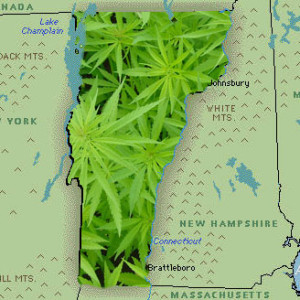A New England-based pharmacist is sounding an alarm over potentially harmful marijuana-related compound entering the Vermont food chain.
Judith Margulies, R.Ph., M.Ed., is a registered pharmacist in Vermont and Massachusetts. She told TNR that significant amounts of fat-soluble cannabinoids are likely to be introduced to Vermont-branded meat and milk under the state’s relaxed new laws relating to the cannabis or hemp plant.
The public is most familiar with the cannabis-derived products known as THC (delta-9-tetrahydrocannabinol) and CBD (cannabidiol).

Judith Margulies, R.Ph., M.Ed: “It was disappointing to hear staff members of the Department of Agriculture tell farmers that cannabidiol is ‘no longer a controlled substance.’ This is a false statement.”
According to Margulies, under the new Vermont Hemp Program signed into law by Gov. Phil Scott earlier this year, hemp feed pellets containing CBD will be used for feeding livestock, notably dairy cows.
Margulies says officials’ relaxed attitude about cannabis-derived products in Vermont is troubling.
“It was disappointing to hear staff members of the Department of Agriculture tell farmers that cannabidiol is ‘no longer a controlled substance,’” she said. “This is a false statement. It is currently illegal to sell CBD on the street corner, and more importantly it is not safe.”
Beyond agricultural applications for cannabis plants, the trendy cannabis-wellness fad has spurred a number of pharmaceutical companies to test cannabis-based drugs, like CBD, for a variety of ailments from back pain to autism and even schizophrenia.
CBD in local drug stores
Margulies sees danger in a new line of high-priced, over-the-counter CBD “cure all” products, available at Kenny and CVS drug stores in Vermont. While not specifically a “food chain” concern like hemp feed pellets, the products have untested long-term effects on the human body. Marketed under the CBD Medic brand, these various lotions and liquids contain CBD.
According to Kinney Drugs’ website, cannabidiol (CBD) is a chemical in the Cannabis sativa plant, also known as marijuana or hemp. More than 80 chemicals known as cannabinoids have been identified. Delta-9-tetrahydrocannabinol (THC), the major active ingredient in marijuana, is the most widely known of the chemicals. Cannabidiol obtained from hemp contains only very small amounts of THC. Each of these chemicals has medicinal properties.
Since the passage of the 2018 Farm Bill, it has been legal to sell hemp and hemp products in the U.S. However, not all hemp-derived cannabidiol products are legal. According to the website, “Cannabidiol cannot be included in products marketed with therapeutic claims and can only be included in ‘cosmetic’ products if the product contains less than 0.3 percent THC (the psycho-active component of cannabis).”
Pro-cannabis opportunists have been taking note. Retired NFL Patriots football star Ron Gronkowski now has a big stake in the “cosmetic” cannabis market and is the new public face of CBD Medic.
It’s a fact which Margulies finds especially disturbing.
“Ron is well liked among football fans and he is now helping to normalize CBD use,” she said, adding that cannabinoids like CBD accumulate in the body’s fat cells, in addition to other medical concerns.
According to a report by the U.K. Guardian online, “(CBD) has seen only minimal testing in human clinical trials, where scientists determine what a drug does, how much patients should take, its side effects and so on.”
CBD on the farm
Regarding hemp feed use on Vermont farms, Margulies said it will be nearly impossible for farmers to determine the concentration of the cannabinoids in the pellets. In a July 3 letter sent to Secretary of State Jim Condos, Secretary of Agriculture Anson Tebbets, and others, she expressed her concern:
Hemp feed pellets are formed from either the whole plant or parts of the hemp plant. Due to spikes in cannabinoid concentrations as a plant matures in the final weeks of the growth cycle, especially when under adverse growing conditions, significant amounts of fat-soluble cannabinoids (THC and CBD) can be introduced to Vermont branded meat and milk.
Margulies told TNR that the Vermont Department of Agriculture reports that 90-98 percent of the state’s hemp crop is intended for use in producing the drug CBD.
“With aggressive marketing, non-prescription, illegal consumer sales have increased in recent years,” she wrote to Condos and Tebbets. “Do not confuse (1) hemp seed which has negligible amounts of cannabinoids as feed with (2) hemp feed pellets which are formed from either the whole plant or parts of the hemp plant.”

Whether on Vermont farms or on local drug store shelves, Margulies sees the rush to use CBD and similar compounds as skirting the FDA’s established “controlled substance” rules regarding cannabinoids.
Margulies has not yet heard from state officials about her concerns. But in the meantime, she’s equally disturbed by the fact that the Vermont Hemp Program did not get a fair public hearing along with more input from medical professionals regarding cannabinoids and the food chain.
“There was no posting on the Secretary of State’s website for the public’s awareness of the opportunity to comment on rules for a Vermont Hemp Pilot Program. What was the legal basis for establishing a new pilot program for hemp in Vermont as the hemp law signed by Governor Scott on May 30, 2019, appears to have eliminated any previously adopted hemp laws and those relative to a pilot program?”
Whether on Vermont farms or on local drug store shelves, Margulies sees the rush to use CBD and similar compounds as skirting the FDA’s established “controlled substance” rules regarding cannabinoids.
Despite the Farm Bill, Margulies, as a registered pharmacist in both Vermont and Massachusetts, is still required to advise patients who use CBD about “severe intractable seizures” caused by the drug.
Margulies said that despite the “miracle-cure marketing” of CBD, the drug is associated with an increased risk of suicide and possible liver damage.
“Cannabidiol is a ‘non-intoxication, psychoactive drug.’ What does that mean? It effects the brain,” she said. She also noted that “although not proven in humans, in animal studies and in ongoing investigational study, it is believed use of CBD may increase genetic abnormalities, decrease the ability of red blood cells to carry iron, decrease peripheral nerves, and increase intraocular pressure leading to blindness.”
It may be too late to pull back on CBD in Vermont, but that won’t stop Margulies from speaking up to public officials by letters and at public meetings.
“I care about consumers who are being promised unproven healing powers from the drug cannabidiol which the FDA states is illegal to be sold without a doctor’s prescription as a Schedule V Controlled Substance,” she said. “And I care about the Vermont brand, safeguarding the food supply by adhering to the legal requirements of the FDA preventing cannabinoids in animal feed pellets created from hemp.”
Lou Varricchio is a freelance reporter for True North Reports. Send him news tips at lvinvt@gmx.com.



Here we go again. The feel good Lib/Dem/Progs with the help of our “esteemed” Gov. who has been a disappointment to many who voted for him, have leaped ahead looking for uncharted wates without checking to see if there is any water in the pool. Now we have to see what unintended consequences we are going to have to endure this time around. Seems that this kind of muddy thinking will never end.
An August 2019 letter from the FDA to Senator Sanders office states:
“… it [hemp law] explicitly preserved the Food and Drug Administration’s (FDA or the Agency) authorities to regulate hemp products, including CBD products, under the Federal Food, Drug, and Cosmetic Act (FD&C Act) and Section 351 of the Public Health Service Act. ”
“therefore, FDA [not the Usda] is regulating hemp and hemp derived products that fall under the Agency’s jurisdiction, like any other products [drugs] regulated by the Agency.”
They go on to say they the FDA is regulating CBD for the safety of the public. and the the FDA informs:
“FDA has therefore concluded that it is a prohibited act under the FD&C Act to introduce or deliver for introduction into interstate commerce any food (including any animal food or feed) to which CBD has been added. For similar reasons, CBD products do not meet the statutory definition of a dietary supplement under 201(ff)(3)(B) of the FD&C Act. “
And the rats come crawling out of the woodwork. What a bunch of BS. CBD is helping / curing so many, they are afraid big pharma’s stuff will hit the fan. Well, it is. Finally, we have an all natural non addictive PLANT that NO ONE can put a “patent” on that actually WORKS, so now they toss out the fear factor in a hail Mary. There will be paid moaners, all trying to spin their stuff depending on how much they get paid. What a joke.